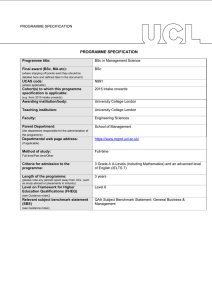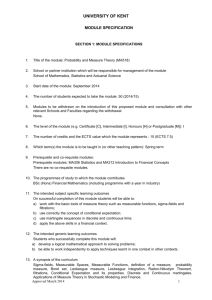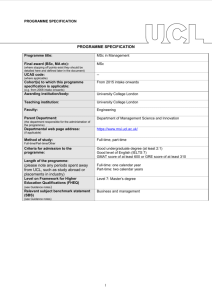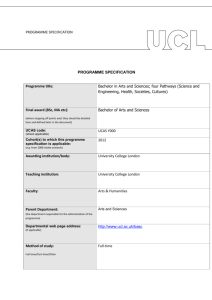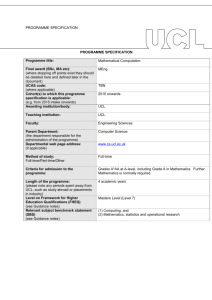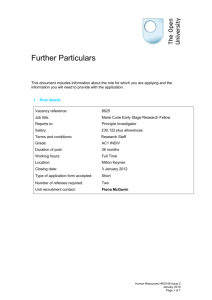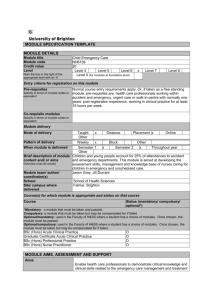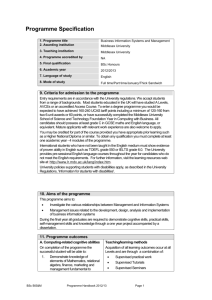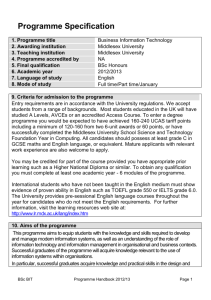BSc Management Science - University College London
advertisement
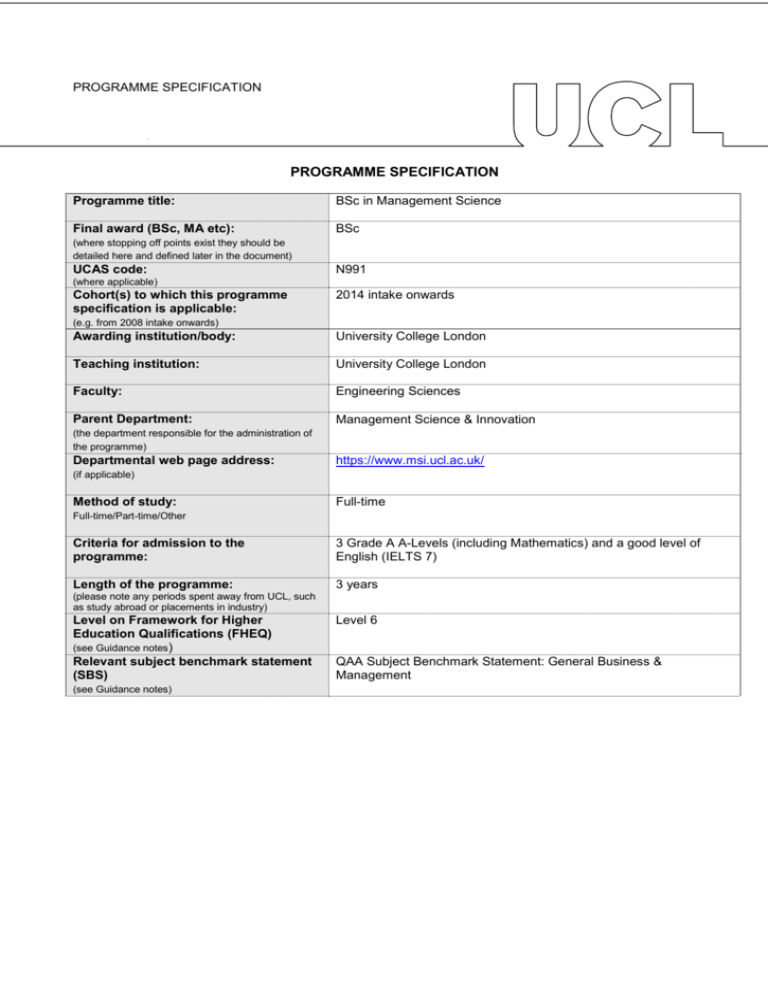
PROGRAMME SPECIFICATION PROGRAMME SPECIFICATION Programme title: BSc in Management Science Final award (BSc, MA etc): BSc (where stopping off points exist they should be detailed here and defined later in the document) UCAS code: N991 (where applicable) Cohort(s) to which this programme specification is applicable: 2014 intake onwards (e.g. from 2008 intake onwards) Awarding institution/body: University College London Teaching institution: University College London Faculty: Engineering Sciences Parent Department: Management Science & Innovation (the department responsible for the administration of the programme) Departmental web page address: https://www.msi.ucl.ac.uk/ (if applicable) Method of study: Full-time Full-time/Part-time/Other Criteria for admission to the programme: 3 Grade A A-Levels (including Mathematics) and a good level of English (IELTS 7) Length of the programme: 3 years (please note any periods spent away from UCL, such as study abroad or placements in industry) Level on Framework for Higher Education Qualifications (FHEQ) (see Guidance notes) Relevant subject benchmark statement (SBS) (see Guidance notes) Level 6 QAA Subject Benchmark Statement: General Business & Management Brief outline of the structure of the programme and its assessment methods: (see guidance notes) Management Science BSc The BSc in Management Science provides students with a rigorous foundation in the key knowledge and skills needed to build successful careers in global businesses, through a combination of core and elective modules, assessed by coursework, and research and consulting projects. Core modules in mathematics, critical analytical thinking, business economics, data analytics and behavioural science provide a solid grounding in the concepts and tools that underpin the practice of management in complex, innovation-intensive, data-driven environments. Additional core modules, including strategy, marketing, operations and finance, provide an in-depth understanding of how companies work and build the insight and skills needed to deliver result through people. The design of the core modules will draw on the extensive body of material available from existing MS&I courses. This material will be integrated and extended to incorporate a strong quantitative element and a focus on the knowledge and skills needed to deal with key interdisciplinary management challenges (e.g. complexity, scale, growth, uncertainty, risk), including how people from different disciplines approach business problems. Scenario weeks focused on example business challenges will be used to support problem-based learning and provide a context for the application of the knowledge and skills from the core modules. Interdisciplinary examinations and research and consulting projects will be used to assess students’ ability to apply this material in practice. The programme structure is aligned with the design of the Integrated Engineering Programme (IEP) initiative. In Years 2 and 3, students take an Engineering Sciences minor in another discipline (0.5 credit unit in Year 2; 1 credit unit in Year 3). This provides students with an opportunity to explore an area in greater depth and continuity than could be done by taking individual electives. Board of Examiners: i) Name of Board of Examiners: MSINUMS BSc/MSci Management Science Board Professional body accreditation (if applicable): N/A Date of next scheduled accreditation visit: EDUCATIONAL AIMS OF THE PROGRAMME: The Management Science BSc/MSci programme is designed to provide students with a rigorous foundation in the key skills required to build successful careers in global businesses. It aims to produce graduates who combine strong quantitative and analytical skills with an in-depth understanding of how companies work. The programme has the following educational objectives: Provide students with in-depth knowledge and understanding of management science and how it can be applied in practice; Prepare students for practice in a diverse range of complex, innovation-intensive, data-driven environments; Prepare students for jobs in industries and organisations characterised by rapid changes in tools, problems and opportunities, requiring self-development over an entire career. Enable students to develop the awareness, background, and skills necessary to become responsible citizens, employees, and leaders who can make a contribution to tackling some of the world’s most difficult social and economic problems. In particular, the programme will help students develop: A critical appreciation of the relevant principles of mathematics, science, and engineering and how they can be applied in practice to managing complex, innovation-intensive, data-driven environments; A knowledge and understanding of management in a global context and the opportunities and problems faced by different types of organisation; An understanding of key interdisciplinary management challenges, e.g. complexity, scale, growth, uncertainty, risk; An ability to use quantitative and qualitative methods in a creative and systematic way to make wellinformed, evidence-based decisions; An ability to identify, formulate, and solve management problems, based on critical analytical thinking; An ability to design and implement management systems and processes to meet desired needs; An ability to function on multidisciplinary teams; An ability to communicate effectively; An ability to deliver results through people; A recognition of the need for and an ability to engage in life-long learning; An understanding of professional and ethical responsibility; A knowledge of contemporary issues necessary to understand the impact of business in a global and societal context PROGRAMME OUTCOMES: The programme provides opportunities for students to develop and demonstrate knowledge and understanding, qualities, skills and other attributes in the following areas: A: Knowledge and understanding Knowledge and understanding of: Teaching/learning methods and strategies: Management science and how it can be applied in practice Relevant principles of mathematics, science and engineering Management in a global context Management in complex, innovationintensive, data-driven environments Key interdisciplinary management challenges Contemporary issues necessary to understand the impact of business in a global and societal context Combination of core and optional modules that combine the foundations and principles of mathematics, science and engineering with an in-depth understanding of how companies work. Examples, applications and case studies used in courses will be selected to be relevant to the practice of management. Examples, applications and case studies used will include global companies and international organisations. Scenario weeks focused on example business challenges will be used to support problem-based learning and provide a context for the application of the knowledge and skills from the core courses. In Years 2 and 3, students take a IEP minor in another discipline (0.5 credit unit in Year 2; 1 credit unit in Year 3). This provides students with an opportunity to explore an area in greater depth and continuity than could be done by taking individual electives. Assessment: Coursework and/or projects B: Skills and other attributes Intellectual (thinking) skills: Teaching/learning methods and strategies: Strong mathematical and quantitative skills Critical analytical thinking Evidence-based decision-making In Years 1 and 2, students take three modules on the Mathematical Foundations of Management and two modules on Data Analytics. The programme includes core modules on Critical Analytical Thinking,and Decision and Risk Analysis and rigorous approaches to identifying, formulating and solving management problems will be reinforced in all courses. Assessment: Coursework and/or projects C: Skills and other attributes Practical skills (able to): Teaching/learning methods and strategies: Ability to identify, formulate and solve management problems Ability to design and implement management systems and processes Ability to function on multidisciplinary teams Ability to deliver results through people The programme includes core modules on Critical Analytical Thinking and The Art and Science of Management which equips students with the underlying principles, approaches and core skills needed to plan, design and implement complex economic and technological management systems. The programme includes core modules on Behavioural Science and Delivering Results Through People and will use opportunities for group work to develop skills required to function on multidisciplinary teams and deliver results through people. Assessment: Coursework and/or projects D: Skills and other attributes Transferable skills (able to): Teaching/learning methods and strategies: Ability to communicate effectively both orally and in writing Computing skills The programme includes a core module on Critical Analytical Thinking and will use opportunities for group work and interaction in seminars and Scenario Weeks to develop communication skills. Computing skills will be developed as part of the Data Analytics and Computational Thinking modules. Assessment: Coursework and/or projects The following reference points were used in designing the programme: the Framework for Higher Education Qualifications: (http://www.qaa.ac.uk/en/Publications/Documents/Framework-Higher-Education-Qualifications-08.pdf); the relevant Subject Benchmark Statements: (http://www.qaa.ac.uk/assuring-standards-and-quality/the-quality-code/subject-benchmark-statements); the programme specifications for UCL degree programmes in relevant subjects (where applicable); UCL teaching and learning policies; staff research. Please note: This specification provides a concise summary of the main features of the programme and the learning outcomes that a typical student might reasonably be expected to achieve and demonstrate if he/she takes full advantage of the learning opportunities that are provided. More detailed information on the learning outcomes, content and teaching, learning and assessment methods of each course unit/module can be found in the departmental course handbook. The accuracy of the information contained in this document is reviewed annually by UCL and may be checked by the Quality Assurance Agency. Programme Organiser(s) Stephen Todd Name(s): Date of Production: 16th January 2013 Date of Review: September 2014 Date approved by Head of Department: September 2014 Date approved by Chair of Departmental Teaching Committee: Date approved by Faculty Teaching Committee October 2014 January 2015
